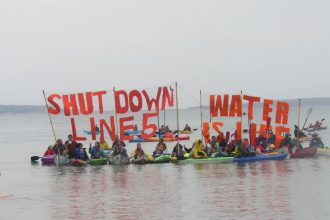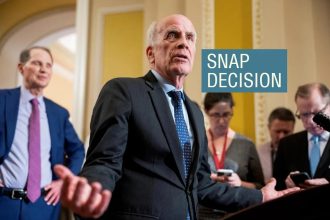NEW YORK — Zohran Mamdani is poised to make history in November: If polling holds, he’ll be the first New York City mayor in recent memory to win without majority support.
That would be a shaky foundation for anyone at the helm of City Hall. And Mamdani is already a polarizing figure — a democratic socialist with a sprawling progressive agenda that requires the blessing of Albany.
The frontrunner has consistently polled at around 45 percent in the contentious general election, far short of anything that could be considered a mandate, even as he continues to best second-place contender Andrew Cuomo by double digits.
A win is a win, but the margin of victory is also a barometer of how deferential unions, political organizations and elected officials will be when it comes to the city’s chief executive. If Mamdani wins without even a simple majority, it will make it that much more difficult to construct coalitions to advance his agenda.
“It’s not going to be easy,” said Basil Smikle Jr., former head of the New York State Democratic Party. “If he gets under 50 percent, that means half or more of voters wanted someone more moderate or conservative than he is. And that says a lot about how he will govern.”
Newly elected mayors typically draw on their newfound — and often peak — political capital to influence the race for New York City Council speaker and make a case for their legislative agenda in Albany. Organized labor and the support of City Council members is also crucial in advancing major policy proposals throughout their tenures.
Claiming to speak on behalf of a city of 8.5 million people becomes less credible if most voters wanted someone else. And because of Mamdani’s identity as a democratic socialist, his pledge to raise taxes on the corporate class and his critiques of Israel, there will likely remain monied, politically moderate interests waiting in the wings to attack the state legislator should he vanquish Cuomo for a second time.
“It’s a problem for him if he comes under 50 percent,” said one Democratic political strategist who was granted anonymity to discuss the frontrunner’s future. “He has a series of people who are his enemies and they are probably not going to beat him at the ballot box, so they are going to look for other ways to undermine him.”
But Mamdani is a candidate like no other in recent memory. His grassroots primary campaign was fueled by a dedicated following of tens of thousands of volunteers who knocked on doors more than 1.6 million times, plastered voters’ homes with literature as fast as they could dispose of it and expanded the electorate to historic numbers.
As Election Day looms a little more than a month away, his campaign is aiming to top those efforts in the hopes of driving him over the 50 percent threshold and, in the process, potentially redefining what political power in New York City looks like.
“Whoever wins will have a mandate. If it’s Cuomo it will be a major come-from-behind effort. If Mamdani, it’s his 46,000-plus volunteers who are passionate, fired up and ready to march through walls for him,” said Chris Coffey, head of political consultant firm Tusk Strategies. “If Mamdani can use that passion in Albany, or with potential legislative primaries or the threat of them, moderates will take note. And that’s the only real mandate he needs.”
Because New York City is overwhelmingly blue, the winner of the Democratic primary often cruises through a sleepy general election with a comfy margin, signaling to other New York City elected officials that many of their own constituents are on board with the City Hall agenda. Put another way, the not-so-secret ingredient of political capital is self preservation.
Incumbent Mayor Eric Adams won his general election with 66 percent of the vote. His predecessor, Bill de Blasio, netted north of 65 percent in each of his general elections, though his reelection turnout was extremely low. Even Michael Bloomberg, who ran both as an independent and a Republican over his three terms in office, managed to squeak just beyond the 50 percent threshold each time.
Mamdani trounced Cuomo in the primary, besting the former governor by nearly 13 points as he expanded the electorate to include an historic share of younger voters and activated neighborhoods that previously lacked political heft.
But Mamdani’ polarizing history as an outspoken member of the Democratic Socialists of America has caused moderates and some conservatives to dig in. They have cast their lot with the former governor, who is running on an independent ballot line and consistently netting in the upper 20 percent margin in polls.
When the double-digit vote of Republican nominee Curtis Sliwa is added into the mix, along with the single-digit crumbs sticking to incumbent Eric Adams — who ended his campaign last week but who will remain on the ballot regardless — it is little wonder Mamdani is falling short of some of his predecessors.
And with margins like that, he will likely need to spend additional time and energy winning over his skeptics if he hopes to tamp down the type of opposition that could hamper his young administration if he becomes mayor-elect on Nov. 4.
“He’s going to have to continue the work of the campaign to go out and make voters feel comfortable with his leadership,” Smikle Jr. said. “And I don’t think he will have finished that work by the election.”
Yet while the state legislator is on track to win with a margin suggesting a divided city, he is also uniquely poised to overcome that shortcoming.
Mamdani’s volunteer network has grown from around 50,000 in the primary to roughly 75,000 in the general, according to his campaign, which hopes to eventually grow those ranks to 90,000. And a recent report in THE CITY noted those devotees are being sent deep into Cuomo territory to canvas potential voters. Numbers like that, along with a willingness to engage behind enemy lines, are bound to influence interactions between Mamdani and any elected official who’s vulnerable to a primary on their left, particularly because the mayoral frontrunner stayed competitive even in districts that he lost.
The Mamdani camp is also hoping to outperform polling once again and aims to crack a majority and then some.
Data from the New York City Board of Elections shows that 46,000 new voters have been added since the primary, with just over 80 percent of them under the age of 40, according to Mamdani’s campaign. Spokesperson Dora Pekec said that bodes well for the team’s registration efforts and their performance come Election Day, especially considering Mamdani’s following among younger voters.
“Zohran Mamdani won the Democratic primary with more votes than any nominee in history,” Pekec said in a statement. “Now, running in an unprecedentedly crowded field, he maintains a 20-point lead across public polling. New Yorkers are ready for change.”
Elected officials, even those far more moderate than Mamdani, have lined up behind the Democratic nominee, even if some have done so with reservations. Gov. Kathy Hochul, Attorney General Letitia James and both leaders of the state legislature — Senate Majority Leader Andrea Stewart Cousins and Assembly Speaker Carl Heastie — have all given their blessing. The two glaring exceptions are House Minority Leader Hakeem Jeffries and Senate Minority Leader Chuck Schumer.
According to state Sen. Liz Krueger, regardless of Mamdani’s ultimate margins, that amounts to a recognition that Democrats across New York would do well to get on board with the mayoral frontrunner’s platform.
“All the things he is messaging very effectively as the candidate — despite much of the Democratic Party’s attempts to not let him get this far — reflect the fact those are messages that really do work in New York City or in upstate New York and that people running need to address those same issues,” she said.









